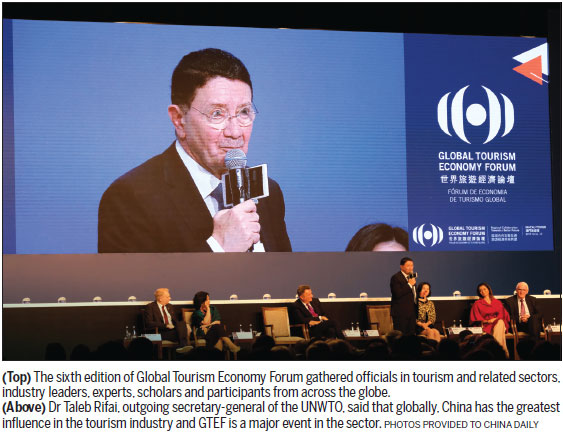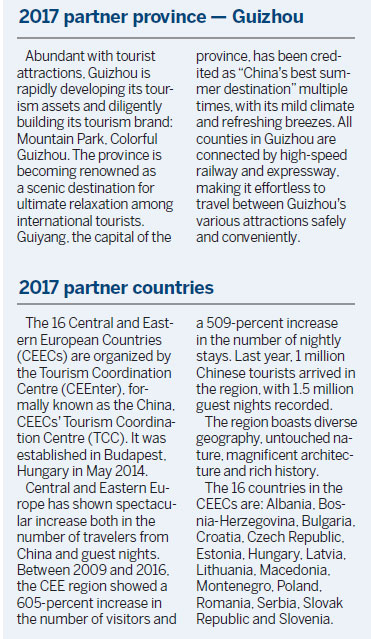GTEF 2018 to feature EU as partner region
Updated: 2017-12-12 06:42
(HK Edition)
|
|||||||
2017 forum lines up over 60 distinguished speakers from around the world for dialogues on regional collaboration
Global Tourism Economy Forum 2017 successfully held its sixth edition from Oct 16-17 in the Macao Special Administrative Region, marked by a number of milestones. With the forward-thinking tourism theme "Regional Collaboration Towards a Better Future", the sixth edition of GTEF gathered around 1,500 ministerial-level officials in tourism and related sectors, industry leaders, experts, scholars and participants from across the globe for a series of profound discussions on how regional tourism collaboration can be an integral part of the Belt and Road Initiative and sustainable global tourism development. With the 16 Central and Eastern European Countries (CEECs) as the partner region and Guizhou province as the partner province, the two-day event was covered by 150 international and domestic media representatives. In driving global private sector cooperation that is key to China's "going out and bringing in" strategy, GTEF also rolled out an array of business matching and presentation sessions to foster exchanges between Chinese and international tourism players.
This year's Forum showcased 60 distinguished speakers from more than 20 countries and regions. The first day's program was highlighted by two distinguished sessions - a special keynote session entitled "A Journey Well-Traveled" as a tribute to Dr Taleb Rifai the outgoing UNWTO secretary general, and GTEF's signature session "Face to Face, Ministers and Private Sector CEOs" in collaboration with UNWTO. Dr Rifai said that globally, China has the greatest influence in the tourism industry and GTEF is a major event in the sector. "This forum, GTEF, has come to represent today all what China and Asia mean to the world, and that is why it is a very important forum."
Crossing borders
The thought-provoking discussion during the aforementioned session featured the strongest speaker lineup ever, including 10 ministerial and governmental officials from countries across Asia and Central and Eastern Europe, as well as six private-sector leaders. The global exchange of people and ideas continues to be driven by strong proponents of free trade and cross-border cooperation. In light of this, China's Belt and Road Initiative has led to the establishment of various collaborative economic frameworks, including the "16+1" between the 16 CEECs and China. These frameworks will serve as the foundation for future regional alliances, and spotlight the topic of economic cooperation in tourism. At this session, the speakers leveraged cross-continental experiences to explore how regional and inter-regional collaboration can create positive developments across geographic borders.
Participating speakers also shared successful examples and experiences of public and private partnerships. Some of them have elaborated on the regional collaboration between CEECs. These countries possess tremendous potential for further development, but in the face of competition in the European tourism industry, the 16 CEECs need to join hands and step up their collaboration. In terms of aviation networks, the CEECs are not as well connected as their Western counterparts. Many international visitors have already set foot in Paris or London, but the 16 CEECs possess different advantages and unique characteristics. In addition to the short flight durations between countries, more visitors from various Asian metropolitan cities are interested in travelling to Central and Eastern Europe. These countries should enhance cross-border collaboration and adopt incentive measures to attract visitors to boost regional tourism across borders.
Setting the topics
On the second day of the forum, government, industry and academic leaders discussed trend-setting topics, such as China's establishment of the Greater Bay Area (that encompasses Hong Kong, Macao and Guangdong province), technology and innovation in tourism, and China's outbound tourism development.
In addition, three concurrent sessions and workshops were held: "Consumption Upgrade & Market Strategies", "World Heritage & Regional Cooperation" and "Building a Brighter Future for Cities through Collaboration". These sessions outlined directions and a comprehensive picture of future tourism development for delegates. Through different sessions and networking activities, the forum will continue to offer unrivalled opportunities for business matching and networking among delegates from China and around the world.
In addition, the forum hosted activities specially presented by the partner province and the partner region, including the "Fascinating Guizhou - A Heaven of Myriad Mountains" presentation lunch, and the session themed as "Spectacular, Fun and Prizes - CEEnter: Central and Eastern Europe". Through an exhibition of photos, the former showcased the splendid culture and landscape of Guizhou to Forum delegates, while the latter presented the destination glamour of the 16 CEECs.
A notable development during the forum was the launch of the fourth edition of the UNWTO/GTERC Asia Tourism Trends report, a joint-research report published by the UNWTO and the Global Tourism Economy Research Centre (GTERC). The 2017 report contextualizes the impactful trends of regional collaboration and technology in tourism, and delves into future tourism development in Asia Pacific. The report's analysis provided critical insight into long-term trends for industry decision makers, with the aim of advancing sustainable development of the global tourism economy.
Carrying on into 2018
Secretary for Social Affairs and Culture of the Macao SAR Government and Executive Chairman of GTEF Alexis Tam said in his closing speech that, even a typhoon could not prevent distinguished guests and delegates from attending the forum. The widening scope of participation in the forum speaks volumes with regard to its increasing influence as an example of embracing regional collaboration. Against the backdrop of the promising "16+1" economic framework, GTEF's 2017 partnership with the CEE region helps to plant the seeds of China's Belt and Road Initiative in Europe where it is growing and flourishing. CEECs' participation in this edition of GTEF has opened another window of opportunity for further regional cooperation in tourism.
Vice-Chairman and Secretary-General of GTEF Pansy Ho concluded GTEF 2017 with an outlook toward even stronger cooperation in global tourism: "With political will, psychological consensus and mutual trust, regional collaboration can create a sustainable ecosystem likened to a spider web, a dynamic hub-and-spoke framework with meticulously woven strands of web in just the right places, all interrelated, interdependent, indispensable and strategically aligned with the overall structure to create a collective outcome."
In building on the productive results of the past sixth editions, the city of Macao is committed to marking innovative chapters on the program and format of the next edition, with the aim to enable delegates to forge far-reaching tourism cooperation across industries, sectors and regions through the forum as an international exchange platform.
GTEF concluded with the exciting announcement that the seventh edition of GTEF in 2018 will be held in partnership with the European Union in support of the 2018 as the "EU-China Tourism Year". The forum will bring forth the world of opportunities set free by in-depth tourism cooperation between China and Europe, with much to look forward to in Macao next year!
For more information about the forum, please visit www.gte-forum.com and stay tuned for event updates via official social media channels of GTEF.



(HK Edition 12/12/2017 page1)